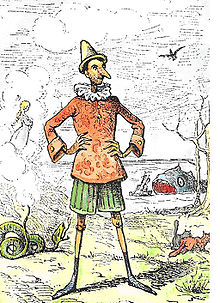 Overcast and some ground fog early Tuesday on California’s north coast — we’re forecast for maybe-70-percent-chance of rain this morning, and it could happen.
Overcast and some ground fog early Tuesday on California’s north coast — we’re forecast for maybe-70-percent-chance of rain this morning, and it could happen.
Today is the $4 billion Day — in the weird, schizophrenic, and highly-amnesic US of A, the 2014 midterm elections.
And we could be really fucked at the end of the day if Republicans make their predicted mini-surge.
Worse news, though: ‘Tom Magliozzi, one of public radio’s most popular personalities, died on Monday of complications from Alzheimer’s disease. He was 77 years old.’
(Illustration: Enrico Mazzanti’s ‘Pinocchio,’ found here).
Although I haven’t listen to NPR’s ‘Car Talk,’ on any kind of a regular basis for a goodly-number of years, the program has always been a neat experience. Tom and his brother, Ray, hosted the show, and discussed all the different, sometimes off-the-wall, aspects of automobiles, how to repair them, treat them, and just generally in their joking about all kinds of car shit (and themselves), made you feel like you knew your vehicle better. Or at least, appreciated the thing.
Via Time:
Cars, they insist, bond all Americans.
“We can do a show about cars because everybody has cars,” Tom explains, straightening his Home Depot hat and throwing his backpack over his shoulder.
“We couldn’t do a show called Brain Talk.”
Pure exactly.
And with that, a not-so-fortuitous return to today’s subject of the 2014 midterms — or no-brain talk.
According to the Wall Street Journal this morning, American voters are “sullen,” and still in the mood for “change elections,” but the great wad of people who press levers do so against their own interests, like shitting in your own mess kit.
Or maybe, all in the self-cranial, brain talk: ‘Inaccurately perceived self interest seems to be the reason.’
Last week, I came across a piece by David Dunning, professor of psychology at Cornell University, at Pacific Standard magazine about how even the ignorant think they’re smart, but it’s self delusion. A human weakness is self-wrongness.
A really long article, but well worth the read, and it most-certainly applies to the voting booth, too.
Some highlights;
In 1999, in the Journal of Personality and Social Psychology, my then graduate student Justin Kruger and I published a paper that documented how, in many areas of life, incompetent people do not recognize — scratch that, cannot recognize — just how incompetent they are, a phenomenon that has come to be known as the Dunning-Kruger effect.
Logic itself almost demands this lack of self-insight: For poor performers to recognize their ineptitude would require them to possess the very expertise they lack.
To know how skilled or unskilled you are at using the rules of grammar, for instance, you must have a good working knowledge of those rules, an impossibility among the incompetent.
Poor performers—and we are all poor performers at some things—fail to see the flaws in their thinking or the answers they lack.
What’s curious is that, in many cases, incompetence does not leave people disoriented, perplexed, or cautious.
Instead, the incompetent are often blessed with an inappropriate confidence, buoyed by something that feels to them like knowledge.
…
Unfortunately for all of us, policies and decisions that are founded on ignorance have a strong tendency, sooner or later, to blow up in one’s face.
So how can policymakers, teachers, and the rest of us cut through all the counterfeit knowledge — our own and our neighbors’ — that stands in the way of our ability to make truly informed judgments?
The way we traditionally conceive of ignorance — as an absence of knowledge — leads us to think of education as its natural antidote.
But education, even when done skillfully, can produce illusory confidence.
Here’s a particularly frightful example: Driver’s education courses, particularly those aimed at handling emergency maneuvers, tend to increase, rather than decrease, accident rates.
They do so because training people to handle, say, snow and ice leaves them with the lasting impression that they’re permanent experts on the subject.
In fact, their skills usually erode rapidly after they leave the course.
And so, months or even decades later, they have confidence but little leftover competence when their wheels begin to spin.
Or $4 billion worth of political-bullshit torture — pounded dumb by many, many other names.